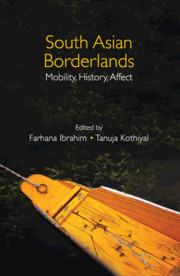Book contents
- Frontmatter
- Contents
- List of Figures and Tables
- Acknowledgements
- Introduction
- 1 Paradise at the Frontier: Kashmir as a Political Terrain and Literary Landscape in the Mughal Empire
- 2 Borders in the Age of Empire and Nation-States: The Honeycomb of Borderlands: Kumaun, Western Tibet and Far Western Nepal
- 3 Borders, Difference, Recognition: On the Cause(s) of Gorkhaland
- 4 Embattled Frontiers and Emerging Spaces: Transformation of the Tawang Border
- 5 Relative Intimacies: Belonging and Difference in Transnational Families across the Bengal Borderland
- 6 Reading Parijat in Nepal: The Poetics of Radical Feminism Negotiating Self and Nation
- 7 Commodity Journeys and Market Circuits: Making Borders ‘Natural’ in Colonial Western Himalayas
- 8 Frontiers, State and Banditry in the Thar Desert in the Nineteenth Century
- 9 Bureaucracy and Border Control: Ethnographic Perspectives on Crime, Police Reform and ‘National Security’ in Kutch, 1948–52
- 10 Frontier as Resource: Law, Crime and Sovereignty on the Margins of Empire
- About the Contributors
- Index
9 - Bureaucracy and Border Control: Ethnographic Perspectives on Crime, Police Reform and ‘National Security’ in Kutch, 1948–52
Published online by Cambridge University Press: 17 September 2021
- Frontmatter
- Contents
- List of Figures and Tables
- Acknowledgements
- Introduction
- 1 Paradise at the Frontier: Kashmir as a Political Terrain and Literary Landscape in the Mughal Empire
- 2 Borders in the Age of Empire and Nation-States: The Honeycomb of Borderlands: Kumaun, Western Tibet and Far Western Nepal
- 3 Borders, Difference, Recognition: On the Cause(s) of Gorkhaland
- 4 Embattled Frontiers and Emerging Spaces: Transformation of the Tawang Border
- 5 Relative Intimacies: Belonging and Difference in Transnational Families across the Bengal Borderland
- 6 Reading Parijat in Nepal: The Poetics of Radical Feminism Negotiating Self and Nation
- 7 Commodity Journeys and Market Circuits: Making Borders ‘Natural’ in Colonial Western Himalayas
- 8 Frontiers, State and Banditry in the Thar Desert in the Nineteenth Century
- 9 Bureaucracy and Border Control: Ethnographic Perspectives on Crime, Police Reform and ‘National Security’ in Kutch, 1948–52
- 10 Frontier as Resource: Law, Crime and Sovereignty on the Margins of Empire
- About the Contributors
- Index
Summary
Studies on militarisation and borders in South Asia have often remained focused on zones of spectacular conflict such as Kashmir or Punjab during the Partition. This chapter tracks the production of a discourse on borders by those charged with border security such as the police and other senior bureaucracy in the decades following the Partition. It suggests that the ‘border question’ evolved gradually out of a series of everyday concerns over local criminality that finally coalesced into the more abstract category of ‘national security’. While we know that the moment of Partition was experienced non-homogenously in different regions, this chapter argues that this is true not only for border residents but also for the bureaucratic and security apparatus that did not always work as a singular entity. The chapter examines bureaucratic debates on police reorganisation in Kutch between 1948 and 1952 to suggest that contemporary discourses on nation and borders were arrived at through intra-bureaucratic negotiations with the far less abstract categories of village, locality and region.
Anthropologists have written extensively on nationalism (Handler 1988; Munasinghe 2002; Verdery 1991; Williams 1989) as they have sought to theorise the state in an ethnographic mode (Trouillot 2001; Das and Poole 2004; Ferguson and Gupta 2002; Mathur 2016; Reeves 2014). Borderlands may be regarded as those conceptual sites where the relationship between the state and the nation can been productively interrogated and historicised (Bhan 2008; Cons 2016; R. Gupta 2013; Ibrahim 2009; van Schendel 2004). I contend here that anthropological literature on borderlands must also take seriously the ‘mundane’ and ‘banal’ ways in which a bureaucratic discourse on borders is produced. I argue that this discourse often precedes—but is also influenced by—the collective imagination of the national community and its attendant rules for sanctioning ‘legitimate’ claims on citizenship, identity and belonging, even as it delegitimises other ways of being as ‘anti’ or not properly ‘national’. Due to constraints of access to contemporary official paperwork pertaining to aspects of national security that are deemed—though not always consistently—‘sensitive’, the ethnography of bureaucracy with regard to borderlands must necessarily turn towards an earlier period where, through cracks in officially constituted archives, some sort of narrative may be crafted.
- Type
- Chapter
- Information
- South Asian BorderlandsMobility, History, Affect, pp. 214 - 233Publisher: Cambridge University PressPrint publication year: 2021

